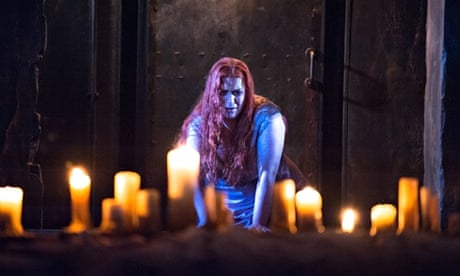With its regular home (the Theatre Royal), currently under construction, Scottish Opera has migrated south of the Clyde to the Citizens theatre for its latest production. It's a revival of Dominic Hill's Macbeth, originally a 2005 touring piece that uses seven singers to cover cast and chorus.
Instead of Verdi's full orchestra we get a chamber ensemble – an awkward compromise in terms of timbre and balance. I wonder why the company didn't just choose an opera that was written for smaller forces in the first place. The production is good, though, and depressingly still as relevant now as it was a decade ago: take your pick of recent examples where lawlessness and brutality have fed instability. Hill imagines a Scotland ruled by modern-day warlords, murkily lit and on the brink of total collapse. The banquet table is laid with vodka bottles and the characters light prayer candles to mourn the dead. It could be a post-conflict bunker anywhere in the world if they weren't singing of Cawdor and Birnam Wood.
Dressed in combats and slick suits, David Stephenson cuts a fine figure and is a strong voice as Macbeth, but he's no mighty leader and that's the point. There's a desperation about him: he murders not because he wants to but because he is too scared not to. Elisabeth Meister's Lady Macbeth is also a credibly uneasy presence. Her voice is shrill and oversized for the setting – as queen, she is tough and crass, downing vodka, smoking fags and carelessly drowning out those around her. The relationship between the Macbeths is strangely blank: no chemistry, fear or affection. Maybe Hill is suggesting that such "soft" feelings have been wiped out by the grimness of their situation, but the result is an emotional deficit at the core of the opera.
The witches (Katie Bird, Martha Jones and Sioned Gwen Davies) are an intriguing trio. They look like sassy lasses courting drama on a night out: are they doubly scary for their innocuousness? They sing well, as does the rest of the cast, and one benefit of the Citz's bone-dry acoustics is that the words (in English) are crystal clear throughout. In the pit, the small ensemble and conductor Derek Clark work hard to summon Verdi's flair for texture. They can't match his full orchestra, but there's something in the acerbic fragility of the strings that works for this relentlessly uncomfortable drama.

Comments (…)
Sign in or create your Guardian account to join the discussion